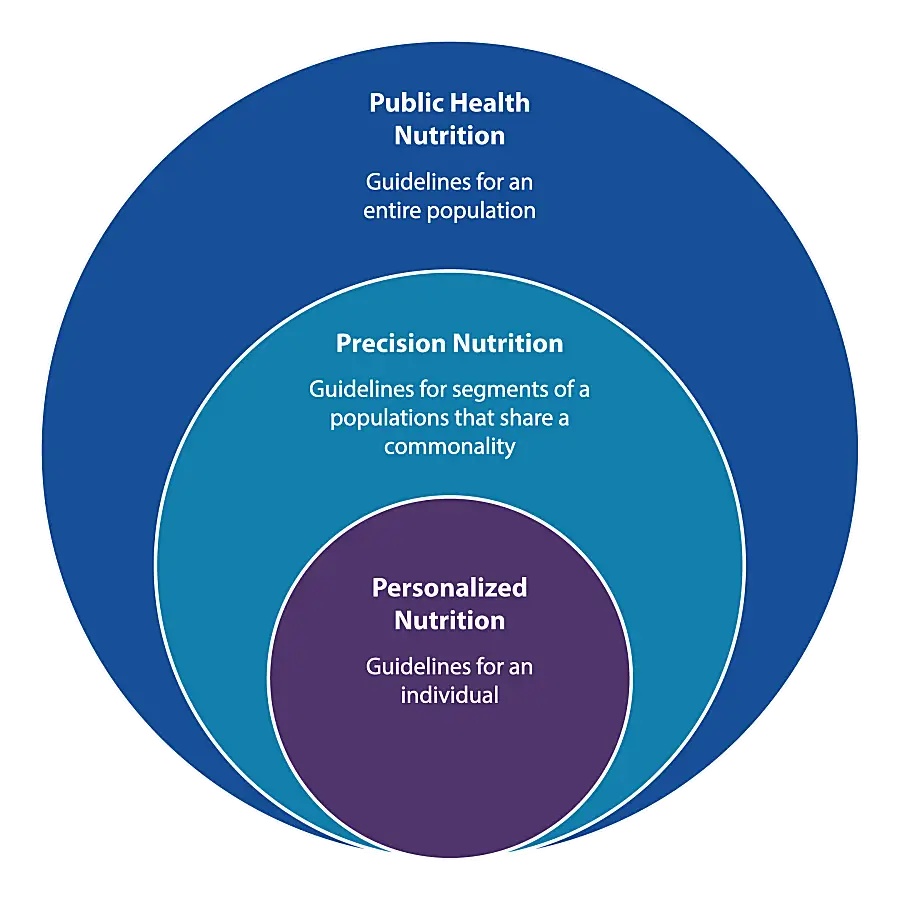
We’ve all heard the saying “you are what you eat”. It’s no secret that nutrition plays a critical role in a person’s health and wellbeing. But what if we need to flip that saying on its head—"what you eat is because of who you are”? Personalized nutrition promises just that: food, meals, and other products customized specifically for you, based on your demographics, genetics, health, environment, and other factors.
The field of personalized nutrition has garnered significant attention in the past few years and is an example of when commercial activity outpaces scientific advancement. “personalized nutrition” and you’ll find a range of start-ups providing digital coaching tools based on a questionnaire, personalized products from assessing one biomarker or indicator of health status, and dietitians and lifestyle coaches offering customized meal plans. There’s been a flurry of terms used interchangeably (e.g. personalized, precision, customized), and it is sometimes misleading.
To help demystify what personalized nutrition truly means, understand the state of the science, and help consumers and companies operating in the space, we sat down with Micaela Cox and Andrea Strauss, both Innovation Analysts at RTI Innovation Advisors, a business unit of RTI. Cox is an expert in distilling the state of the science regarding the health benefits of food ingredients to inform corporate and not-for-profit food and agriculture clients. Strauss supports commercial clients by providing strategy, insights, and commercialization services across product development for new markets, foresights for sustainability strategy/goals, and sustainable ingredients and processing.
Q: Terminology is important. Can you define personalized nutrition and how that differs (or doesn’t) from other common terms used in this space?
Strauss: Essentially, there are different categories of nutrition that we should think about when talking about personalized nutrition. Starting with the broadest category of public health nutrition, the Dietary Guidelines for Americans are very broad and very well researched but not targeted to any one group. The next tier down is precision nutrition, categorized into smaller groups that share some characteristics or commonalities (e.g., dietary guidelines for individuals with Type 2 diabetes). The last and most specific tier is true personalized nutrition, including dietary guidelines customized specifically to you and based on your specific bio-inputs and needs, like your blood markers, microbiome data, lifestyle, environment, cultural preferences, among other parameters.

Q: What do you think is causing this excitement and buzz around personalized nutrition?
Cox: I would say it’s partly driven by consumers. Consumers are constantly wanting more nutritious foods, and they’re demanding more from the foods they're consuming. This also comes with a lot more scrutiny on what they are consuming and pressure on food and nutrition companies to provide better options.
Strauss: The average consumer is paying more attention to their environment, whether that's their wellness and nutrition, or other purchases. I think it's reflective of the digital age that we're living in, where everything that we're exposed to on a digital side is already quite personalized as far as our own algorithms and marketing. There is both pull and push for getting more personalized data inputs but also caring a little bit more about what you're bringing into your environment and that of your family.
Q: It seems like there’s a lot of commercial activity in this space. Is anyone on the market offering truly personalized nutrition solutions?
Cox: Most startups are focusing on one kind of biomarker as the input for determining what formulation or meal plan you would need. But we, and the scientific community, know that nutrition is more complex than one biomarker. There are companies that have robust studies and are building strong algorithms around the biomarker they’re studying, but it’s still a one-dimensional approach for a many-dimensional need. There's a long way to go to get to what we would say is true personalized nutrition that incorporates all of the factors that are known to be associated with modifying one's nutritional needs.
Strauss: One of the other elements that is lacking currently is understanding how all the different factors that influence nutrition and health interact with each other. It’s not just isolating all the genes that could influence nutrition and health, but also understanding how those genes interact and how the environment might influence the expression of those genes. It's extremely complex, and I think that there are some commercial entities that are closer than others but completely agree that we're far away from true personalized nutrition.
Q: How far do you think we are from true personalized nutrition? What’s the state of the science?
Cox: Thinking of the hype cycle for innovation, we're coming off the hype curve of recognizing the value of personalized nutrition but haven’t yet proved the scientific potential for personalized nutrition. If we continue producing “personalized nutrition” products on the market and the science is not there, we’re at risk of personalized nutrition becoming a fad diet. There's a lot of work to be done before we can really accelerate to personalized nutrition, and I think that precision nutrition will be the first step because it will be relatively easier and could be more equitable.
Strauss: I think within the next 10 years we'll see some iteration of a truly personalized nutrition platform. There’s still a lot of work to be done with to understand an appropriate delivery mechanism for personalized nutrition may look like. Do consumers want wearables that will give them guidance? Do they want modular meal kits? I don’t think we understand yet how consumers want to interact with personalized nutrition and what will lead to the best adherence.
Q: What advice would you give to companies currently operating in nutrition (whether it’s clinical or food and beverage)?
Cox: Monitor advancements in personalized nutrition. Keep track of critical clinical trials, like the Nutrition for Precision Health study, and start to talk to leading researchers. Start to understand where you may be able to play in precision nutrition.
Strauss: Think about how personalized nutrition could have implications on your supply chain. These products, regardless of the delivery mechanism, will inherently require a drastically different supply chain than what the food industry currently relies on. Even if you’re not manufacturing custom products, customizing diets/recipes that require bio-inputs from customers could drastically change your customer base and use of your products.
Q: Since nutrition is such a multi-dimensional issue that impacts society, who do you think should be leading the charge to make an impact in this space?
Strauss: I think there's actually a great opportunity for research consortiums in this space to forge effective partnerships between academic players, industry, and government and regulatory bodies to help move the needle in an equitable way. There are some consortiums and innovation ecosystems already, like the Tufts University Food & Nutrition Innovation Institute and the Food as Medicine Institute, but I expect more to form, especially after we get the results from the pivotal trials Micaela mentioned.


